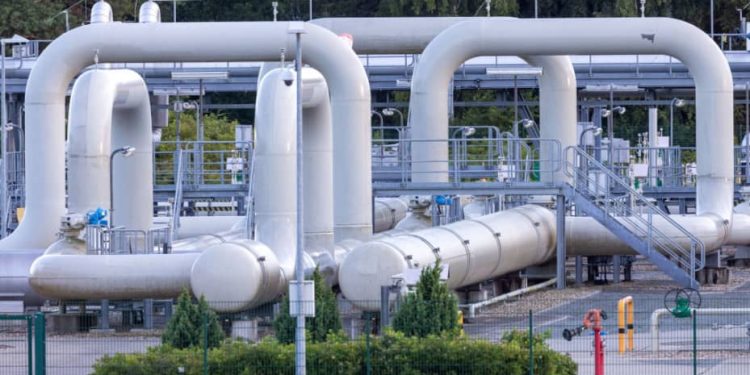Gas prices surged on Monday and the pound and euro slumped after Russia shut down a big pipeline indefinitely.
Russia has used its control of gas supplies to exert pressure on European countries in retaliation against sanctions imposed after its invasion of Ukraine. Gazprom, the Russian state-controlled gas company, closed the Nord Stream 1 pipeline from Russia to Germany on Friday, saying it had found a leak requiring repair.
The threatened cuts to supplies of gas from Russia have prompted a scramble by European countries to store as much gas as possible before winter, as well as efforts to find alternative supplies.
However, the prospect of Russia cutting off an important pipeline completely caused prices to rise on Monday, as investors braced for severe shortages. The contract for gas delivery next month in the UK soared by 35% at one stage and was about 12% higher in afternoon trading at 465p a therm. That was an increase from the 410p a therm cost on Friday afternoon, and approaching the five-month high of nearly 650p set last month.
Winter gas prices were also up sharply. The wholesale UK gas contract for November and December both jumped about 15%, near to last month’s record highs.
The benchmark Dutch TTF October gas contract rose by up to 30%, up €62 to €272 a megawatt hour.
The threat of gas shortages has also deepened concerns over recession risks in economies dependent on fuel for industry and electricity generation, including the UK and the EU. That has caused their currencies to weaken as investors seek safety in the US dollar and reduce exposure to an economy that may have to cut back industrial production meaningfully.
The euro hit a 20-year low against the US dollar, falling as low as $0.9879 in early trading on Monday.
On the day that Liz Truss was confirmed as the UK’s next prime minister, the pound hit $1.1444, its lowest value against the dollar since the early days of Covid-19 in March 2020. Truss is expected to reveal her plans to mitigate the energy crisis in the coming days.
European stock market indices also dropped. Germany’s Dax lost about 2% with France’s CAC down more than 1%.
Kit Juckes, a macro strategist at the Société Générale bank, said: “It’s unclear how long the pipeline will remain shut, but it is still obvious that President Putin is using it as a weapon to weaken European resolve in supporting Ukraine.”
Lee Hardman, a currency analyst at MUFG Bank, said: “Russia’s ongoing weaponisation of energy supplies continues to increase downside risks for European economies and the euro.”
Oil prices also jumped after Opec, the cartel of oil-producing countries, and allies including Russia agreed to cut production by 100,000 barrels a day in October.
The price of Brent crude oil futures, the global benchmark, rose by 3% to more than $95.78 a barrel, up from $93. West Texas Intermediate, the North American measure, gained almost 3% to hit $89.37 a barrel.
Leaders of the G7 countries – the UK, US, France, Germany, Italy, Japan and Canada – agreed on a plan on Friday to cap the prices paid for Russian oil to prevent sales from enriching the Kremlin, although it is unclear if the cap will result in lower prices.
Source: The Guardian




Recent Comments